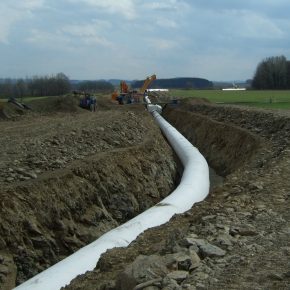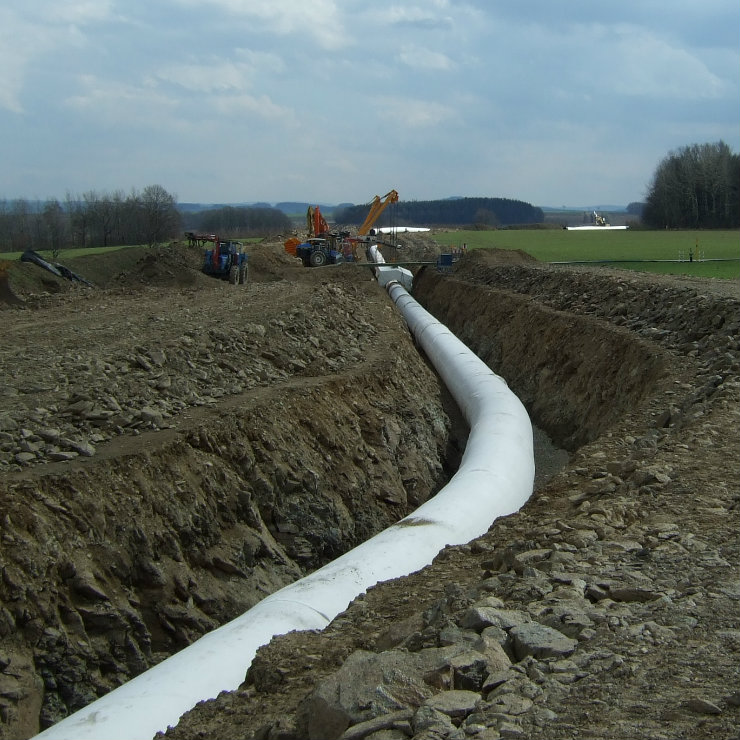Tydzień w gospodarce
Category: Trendy gospodarcze

(malenki, CC BY-SA)
Greek connection is a pipeline linking the newly discovered Israeli gas fields of Tamar and Leviathan to European markets. Bulgaria and Greece have already started construction of the Greek-Bulgaria interconnector (IGB) gas pipeline connecting the Greek gas transmission system to the Bulgarian gas transmission system in the area of Stara Zagora.
The 182 km long project will be a strategic transportation infrastructure not only for Bulgaria, but also for the rest of Southeast Europe, diversifying the sources of gas for the region. It will have a transportation capacity of 3 billion cubic meters per year (bcma) of natural gas, with the possibility of an upgrade to up to 5 bcma. Bulgaria is heavily dependent on Russian gas supplies. The country imports almost all the gas it needs to cover its domestic needs via a pipeline from Ukraine through Romania.
Under half of the estimated 1,000 billion cubic meters (bcm) of gas thought to be in Israel’s reserves is set for export. Israel uses about 10 bcma and has enough gas to cover its needs for 50 years.
Vladislava Tsekova, from ICGB investment, which is tasked with completing the construction of the IGB, said in early February that the project should soon be back on track after procurement procedures for its construction were halted after appeals to the Bulgarian Competition Protection Commission (CPC) due to complaints from a group of companies including a winery and a real estate firm. Bulgarian PM Boyko Borissov’s government hoped construction of the pipeline would begin by June 2018, at the end of the Bulgaria’s six-month presidency of the Council of the EU.
Meanwhile Serbia said it plans to continue purchasing Russian natural and aims to negotiate part of its deliveries through the Turkish Stream gas pipeline. Options are being discussed for a planned 105 km interconnector pipeline from Bulgaria to Serbia, which should be put into operation in 2020, to pump gas from the Turkish Stream.
Russian President Vladimir Putin said in 2017 that Serbia could become an important transit country for Russian natural gas if it joins the Turkish Stream project. He said the volume of Russian gas supplies to Serbia may reach 3.5 bcm by 2022. Gazprom and Hungary have already signed an agreement on Russian gas deliveries to the country via the Turkish Stream gas pipeline through Serbia and Bulgaria.
In June 2017, Cypriot President Nicos Anastasides, Israeli Prime Minister Benjamin Netanyahu and Greek Prime Minister Alexis Tsipras said they were planning to accelerate the development of EastMed Project, that will channel natural gas to Europe from the newly discovered reserves in Israel and Cyprus. A Joint Declaration was signed, in the presence of European Commissioner Miguel Arias Canete. The project could link gas fields offshore Israel to Cyprus, Greece, and Italy.
The idea for constructing the EastMed pipeline was formulated in 2015 and has been confirmed as a Project of Common Interest (PCI), included by the EU Commission in the second PCI list among the Southern Gas Corridor projects. The project’s route is designed to start from the new natural gas discoveries in the East Mediterranean region and envisages a 1,300 km offshore pipeline and a 600 km onshore pipeline.
The chief executive of IGI Poseidon, Elio Ruggeri, told Reuters that it sees a final investment decision on the project by 2020. The agreement set a time-frame of seven years for the project and according to Ruggeri the pipeline would cost USD5.3bn (EUR5bn) to reach the Greek gas system and USD6.4bn (EUR6bn) to reach the Italian system.
Connecting Bulgaria to EastMed would not be simple and probably would require a land-based pipeline between Greece and Bulgaria. The EastMed also includes laying a pipeline from the Leviathan natural gas reservoir to Italy via Greece. Some 35 per cent of the development work on the Leviathan reservoir has been completed. According to the most recent announcement by Delek Drilling Limited Partnership, natural gas from Israel will begin reaching Europe in late 2019.
Many Israeli companies are involved in the construction and development of the Leviathan platform, including Ham-Let Nazareth Illit, Habonim, Inbal Valves, Upper Galilee company Amiad Metal Technologies, and Kibbutz Ein Dor-based company Teldor.
Eleven months after criticizing Gazprom for “isolating” the Bulgarian gas market, the EU’s regulator in early February praised the Kremlin-backed gas exporter for boosting competition by allowing two-way flows between Greece and Bulgaria. The Southern Gas Corridor, worth USD41.5bn, is one of the priority energy projects for the EU. It envisages the transportation of gas from the Caspian region to the European countries through Georgia and Turkey.
Bulgaria is in talks to become a hub for a supply of Azerbaijani gas to Europe. Starting from 2020, one bcm of gas will be supplied from Azerbaijan to Bulgaria, which means that about a million of households in Bulgaria will be provided with gas, supplied via the IGB. The gas will go from Azerbaijan through Georgia, Turkey, Greece, Italy and Albania.
Bulgaria’s Bulgargaz has a long-term contract for 25 years with Azerbaijan’s state oil company SOCAR to supply one bcm per year from Shah Deniz 2. This is about one third of Bulgaria’s domestic consumption. The project’s cost is estimated at around EUR40m.

